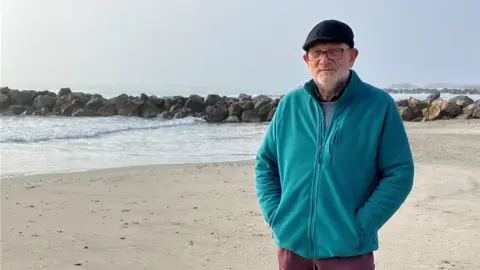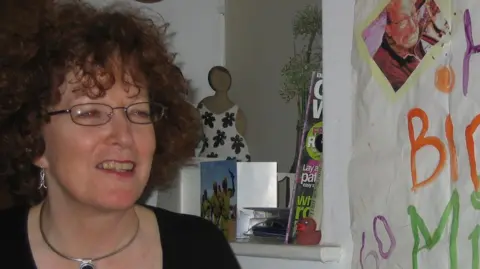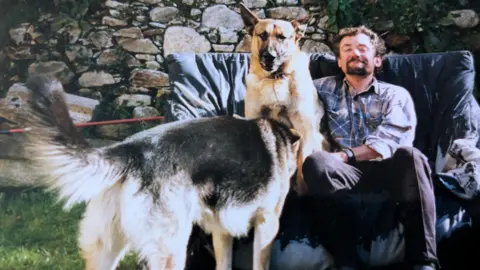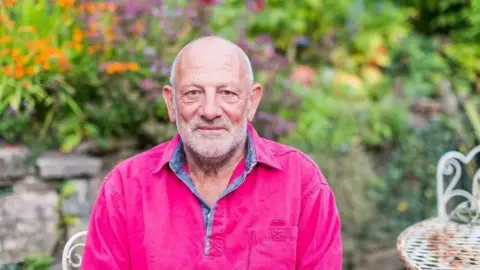'I helped my two best friends die at Dignitas'
 Mick Murray
Mick Murray"I think that before you actually die, your last sense to go is your hearing, so I made a point of talking to Bob about all the mountains we climbed," says Mick Murray.
The 77-year-old is recounting the moment his best friend Bob died in 2015 at the Dignitas clinic in Switzerland.
Mr Murray, from Matlock, Derbyshire, was at his friend's bedside, having helped him arrange the trip there to end his life.
Just over a year before, both men had been there when Bob's wife Ann made the same trip to end her own life in 2014.
Currently, UK law prevents people from asking for medical help to die.
Mr Murray is a firm supporter of the assisted dying bill, which would allow some terminally ill people to have a medically assisted death.
MPs will vote on the bill for the first time on Friday.
 Mick Murray
Mick Murray"I helped them out of compassion, and I think this is one of the things that is missing a bit from this current debate," Mr Murray said of his friends Bob and Ann.
The couple were living in North Wales and had been married for a long time when Ann, 68, was diagnosed with Progressive Supranuclear Palsy (PSP), which causes falls and gradual loss of mobility.
"It's a horrible illness, and towards the end of her life she was unable to do anything for herself. She had to be fed, toileted and washed, but her mind was still working," Mr Murray said.
Ann travelled to Dignitas in February 2014 and died "peacefully with her husband alongside her and a group of friends that travelled there," Mr Murray added.
A year later, Bob, who was an "active mountaineer and climber", was diagnosed with an aggressive form of mesothelioma, a cancer that affects the lining of the lungs.
"Bob was on morphine, so much morphine it should have killed a horse," said Mr Murray.
"He decided also that he would go to Dignitas, and we went there barely a year and a little bit after his wife had been there."
 Mick Murray
Mick MurraySpeaking about his friend's death, Mr Murray said: "Bob decided that he would have Beethoven's Ninth Symphony, Ode to Joy blasting out.
"It was trying to celebrate his life as best we could, it would have been even nicer if we'd been in England in his house at home.
"Both Bob and Ann would have liked to have died at home with a party, a group of friends around them, probably drinking too much red wine.
"This avenue wasn't possible for them.
"I thought it was the most humane thing that they could have done, given that both of them were beyond palliative care."
Critics of the assisted dying bill fear it will mean elderly and vulnerable patients facing pressure to end their lives.
Opponents warn that people could be put under pressure to end their lives and have urged the government to focus on improving palliative care instead.
Paralympian and House of Lords crossbencher Baroness Grey-Thompson is a vocal critic.
 Dignity in Dying
Dignity in DyingShe previously told the BBC she is worried about "the impact on vulnerable people, on disabled people, [the risk of] coercive control, and the ability of doctors to make a six-month diagnosis".
Actor and disability rights activist Liz Carr, who made BBC One documentary Better Off Dead? also opposes changing the law.
"Some of us have very real fears based on our lived experience and based on what has happened in other countries where it's legal," she wrote on X.
Dr Gordon Macdonald, chief executive of campaign group Care Not Killing, said: "This bill is being rushed with indecent haste and ignores the deep-seated problems in the UK's broken and patchy palliative care system."
Dr Bill Noble is a retired consultant in palliative medicine.
He said: "I think it should be an entirely legal process; it should be something like a civil matter, like divorce or adoption or powers of attorney or marriage.
"It's something you choose in your life, which is a much wider question than simply a medical one, and, I think, if it is to be brought about, it needs to be a rigorous process to ensure that people are not doing it for the wrong reason, the wrong reasons being coercion by family, it's rare but it happens, I've seen it."
- If you've been affected by issues in this article, help and support is available via the BBC Action Line.
Follow BBC Derby on Facebook, on X, or on Instagram. Send your story ideas to [email protected] or via WhatsApp on 0808 100 2210.
